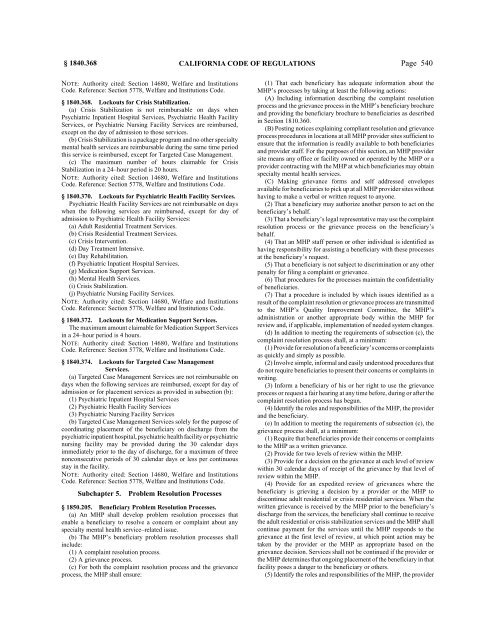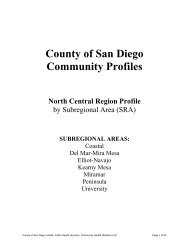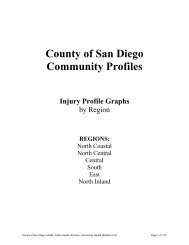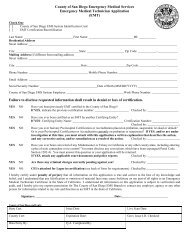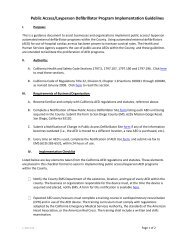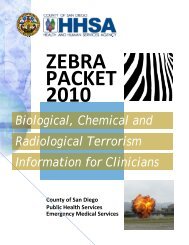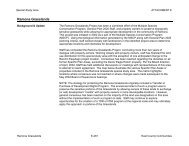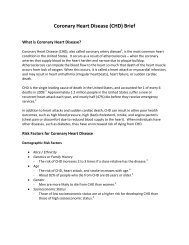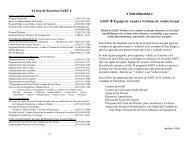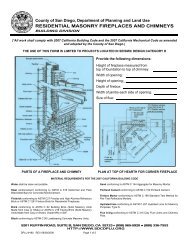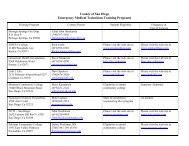CALIFORNIA CODE OF REGULATIONS - State of California
CALIFORNIA CODE OF REGULATIONS - State of California
CALIFORNIA CODE OF REGULATIONS - State of California
You also want an ePaper? Increase the reach of your titles
YUMPU automatically turns print PDFs into web optimized ePapers that Google loves.
§ 1840.368 <strong>CALIFORNIA</strong> <strong>CODE</strong> <strong>OF</strong> <strong>REGULATIONS</strong><br />
Page 540<br />
NOTE: Authority cited: Section 14680, Welfare and Institutions<br />
Code. Reference: Section 5778, Welfare and Institutions Code.<br />
§ 1840.368. Lockouts for Crisis Stabilization.<br />
(a) Crisis Stabilization is not reimbursable on days when<br />
Psychiatric Inpatient Hospital Services, Psychiatric Health Facility<br />
Services, or Psychiatric Nursing Facility Services are reimbursed,<br />
except on the day <strong>of</strong> admission to those services.<br />
(b) Crisis Stabilization is a package program and no other specialty<br />
mental health services are reimbursable during the same time period<br />
this service is reimbursed, except for Targeted Case Management.<br />
(c) The maximum number <strong>of</strong> hours claimable for Crisis<br />
Stabilization in a 24–hour period is 20 hours.<br />
NOTE: Authority cited: Section 14680, Welfare and Institutions<br />
Code. Reference: Section 5778, Welfare and Institutions Code.<br />
§ 1840.370. Lockouts for Psychiatric Health Facility Services.<br />
Psychiatric Health Facility Services are not reimbursable on days<br />
when the following services are reimbursed, except for day <strong>of</strong><br />
admission to Psychiatric Health Facility Services:<br />
(a) Adult Residential Treatment Services.<br />
(b) Crisis Residential Treatment Services.<br />
(c) Crisis Intervention.<br />
(d) Day Treatment Intensive.<br />
(e) Day Rehabilitation.<br />
(f) Psychiatric Inpatient Hospital Services.<br />
(g) Medication Support Services.<br />
(h) Mental Health Services.<br />
(i) Crisis Stabilization.<br />
(j) Psychiatric Nursing Facility Services.<br />
NOTE: Authority cited: Section 14680, Welfare and Institutions<br />
Code. Reference: Section 5778, Welfare and Institutions Code.<br />
§ 1840.372. Lockouts for Medication Support Services.<br />
The maximum amount claimable for Medication Support Services<br />
in a 24–hour period is 4 hours.<br />
NOTE: Authority cited: Section 14680, Welfare and Institutions<br />
Code. Reference: Section 5778, Welfare and Institutions Code.<br />
§ 1840.374. Lockouts for Targeted Case Management<br />
Services.<br />
(a) Targeted Case Management Services are not reimbursable on<br />
days when the following services are reimbursed, except for day <strong>of</strong><br />
admission or for placement services as provided in subsection (b):<br />
(1) Psychiatric Inpatient Hospital Services<br />
(2) Psychiatric Health Facility Services<br />
(3) Psychiatric Nursing Facility Services<br />
(b) Targeted Case Management Services solely for the purpose <strong>of</strong><br />
coordinating placement <strong>of</strong> the beneficiary on discharge from the<br />
psychiatric inpatient hospital, psychiatric health facility or psychiatric<br />
nursing facility may be provided during the 30 calendar days<br />
immediately prior to the day <strong>of</strong> discharge, for a maximum <strong>of</strong> three<br />
nonconsecutive periods <strong>of</strong> 30 calendar days or less per continuous<br />
stay in the facility.<br />
NOTE: Authority cited: Section 14680, Welfare and Institutions<br />
Code. Reference: Section 5778, Welfare and Institutions Code.<br />
Subchapter 5.<br />
Problem Resolution Processes<br />
§ 1850.205. Beneficiary Problem Resolution Processes.<br />
(a) An MHP shall develop problem resolution processes that<br />
enable a beneficiary to resolve a concern or complaint about any<br />
specialty mental health service–related issue.<br />
(b) The MHP’s beneficiary problem resolution processes shall<br />
include:<br />
(1) A complaint resolution process.<br />
(2) A grievance process.<br />
(c) For both the complaint resolution process and the grievance<br />
process, the MHP shall ensure:<br />
(1) That each beneficiary has adequate information about the<br />
MHP’s processes by taking at least the following actions:<br />
(A) Including information describing the complaint resolution<br />
process and the grievance process in the MHP’s beneficiary brochure<br />
and providing the beneficiary brochure to beneficiaries as described<br />
in Section 1810.360.<br />
(B) Posting notices explaining compliant resolution and grievance<br />
process procedures in locations at all MHP provider sites sufficient to<br />
ensure that the information is readily available to both beneficiaries<br />
and provider staff. For the purposes <strong>of</strong> this section, an MHP provider<br />
site means any <strong>of</strong>fice or facility owned or operated by the MHP or a<br />
provider contracting with the MHP at which beneficiaries may obtain<br />
specialty mental health services.<br />
(C) Making grievance forms and self addressed envelopes<br />
available for beneficiaries to pick up at all MHP provider sites without<br />
having to make a verbal or written request to anyone.<br />
(2) That a beneficiary may authorize another person to act on the<br />
beneficiary’s behalf.<br />
(3) That a beneficiary’s legal representative may use the complaint<br />
resolution process or the grievance process on the beneficiary’s<br />
behalf.<br />
(4) That an MHP staff person or other individual is identified as<br />
having responsibility for assisting a beneficiary with these processes<br />
at the beneficiary’s request.<br />
(5) That a beneficiary is not subject to discrimination or any other<br />
penalty for filing a complaint or grievance.<br />
(6) That procedures for the processes maintain the confidentiality<br />
<strong>of</strong> beneficiaries.<br />
(7) That a procedure is included by which issues identified as a<br />
result <strong>of</strong> the complaint resolution or grievance process are transmitted<br />
to the MHP’s Quality Improvement Committee, the MHP’s<br />
administration or another appropriate body within the MHP for<br />
review and, if applicable, implementation <strong>of</strong> needed system changes.<br />
(d) In addition to meeting the requirements <strong>of</strong> subsection (c), the<br />
complaint resolution process shall, at a minimum:<br />
(1) Provide for resolution <strong>of</strong> a beneficiary’s concerns or complaints<br />
as quickly and simply as possible.<br />
(2) Involve simple, informal and easily understood procedures that<br />
do not require beneficiaries to present their concerns or complaints in<br />
writing.<br />
(3) Inform a beneficiary <strong>of</strong> his or her right to use the grievance<br />
process or request a fair hearing at any time before, during or after the<br />
complaint resolution process has begun.<br />
(4) Identify the roles and responsibilities <strong>of</strong> the MHP, the provider<br />
and the beneficiary.<br />
(e) In addition to meeting the requirements <strong>of</strong> subsection (c), the<br />
grievance process shall, at a minimum:<br />
(1) Require that beneficiaries provide their concerns or complaints<br />
to the MHP as a written grievance.<br />
(2) Provide for two levels <strong>of</strong> review within the MHP.<br />
(3) Provide for a decision on the grievance at each level <strong>of</strong> review<br />
within 30 calendar days <strong>of</strong> receipt <strong>of</strong> the grievance by that level <strong>of</strong><br />
review within the MHP.<br />
(4) Provide for an expedited review <strong>of</strong> grievances where the<br />
beneficiary is grieving a decision by a provider or the MHP to<br />
discontinue adult residential or crisis residential services. When the<br />
written grievance is received by the MHP prior to the beneficiary’s<br />
discharge from the services, the beneficiary shall continue to receive<br />
the adult residential or crisis stabilization services and the MHP shall<br />
continue payment for the services until the MHP responds to the<br />
grievance at the first level <strong>of</strong> review, at which point action may be<br />
taken by the provider or the MHP as appropriate based on the<br />
grievance decision. Services shall not be continued if the provider or<br />
the MHP determines that ongoing placement <strong>of</strong> the beneficiary in that<br />
facility poses a danger to the beneficiary or others.<br />
(5) Identify the roles and responsibilities <strong>of</strong> the MHP, the provider


